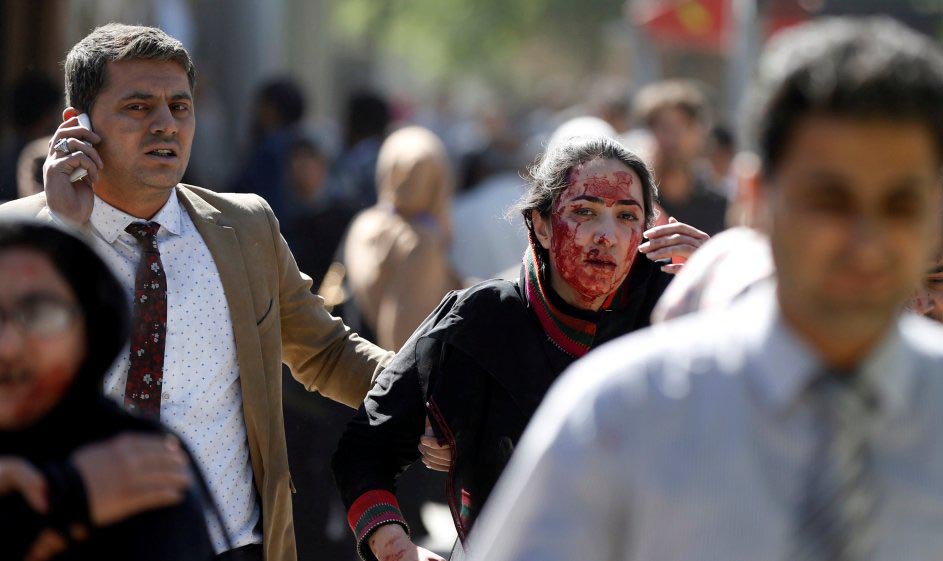Much have been said and written about counterinsurgency and peace talks in Afghanistan. In the meantime, democracy and human rights were debated hotly. The post-Taliban Afghanistan moved towards democratization through approving Constitution and conducting presidential and provincial elections. Having equal suffrage, Afghan men and women flocked to ballot boxes hoping for a civil society void of violence and bloodshed. But the public dream did not come true.
The high hopes of Afghan nation for heaving a sigh of relief in a violence-free Afghanistan are yet to come to fruition. Constitutionally, the natural rights and liberty of men and women are inviolable and the government is committed to respect and protect them. Afghan people are free to exercise their rights without a sense of fear. However, freedoms are curtailed and rights are trampled upon by militant groups.
Terrorist networks are strong obstacle before democratization. They continue their bloodbath without showing flexibility to peace talks. The deadly terrorist attack in the heart of Kabul on Wednesday – the 5th day of Holy Month of Ramadan – which, according to the ministry of public health, killed at least 80 people and wounded more than 450 people, including women and children, reveals the stubborn refusal of warring parties to peace talks. The attack drew the world’s strong condemnation. The responsibility for the attack was denied by the Taliban but claimed by the self-styled Islamic State of Iraq and the Levant (ISIL). However, it has been proved that whenever there are large civilian casualties, the Taliban do not tend to claim the responsibility despite carrying out the attacks.
The spate of terrorist attacks comes as the peace process is negotiated among the world’s officials. For instance, Afghanistan, Pakistan and China held the first round of trilateral Practical Cooperation Dialogue (PCD) this week stating that the trilateral cooperation would lead to peace and stability. In addition, Indian Prime Minister Narendra Modi and German Chancellor Angela Merkel talked regarding the issue of terrorism and peace in Afghanistan. The two leaders discussed Afghanistan and reiterated their support for an Afghan-led and Afghan-owned reconciliation.
Reportedly, Kabul will host an international conference on peace, security and reconciliation next week, with representatives from 20 countries likely to attend the event. Combating terrorism is said to be a key agenda item. Afghan government has repeatedly called on warring factions to stop violence and bloodshed and hold negotiation but militants held out against the peace offering continuing their barbarity. Following the Wednesday’s deadly attack, the Chief Executive Officer Dr. Abdullah Abdullah tweeted: “We want peace but, those who kill us in the holy month of Ramadan don’t worth a call for peace, they most [sic] be destroyed and uprooted.”
Following the death of Mullah Omar’s successor, the negotiation of peace came to an unbreakable stalemate. With Haibatullah at the helm, the Taliban fighters continue their offensives in the strongest possible way. To be honest, the political issue has been highly complicated in Afghanistan. For instance, the rumor circulated this week that helicopters landed in the Taliban-dominated areas in Ghazni province – most likely with the aim of providing weapons – which made some officials suspicious. It is widely accepted that the protracted war in Afghanistan is managed by mysterious hand.
The national and international conferences have not born the desired result. There seems definite reasons behind the failure of peace process. First, warring factions, especially the Taliban who are largely involved in Afghanistan’s militancy, pursue their own political interests and deny to hold talks. Secondly, there are conflicting ideas about peace. After all, the countries, which have political tensions, will not sit around a single table to analyze the roots of terrorism. If the world reaches a unanimous agreement through holding a comprehensive conference, a certain strategy will be adopted to tackle the issue of terrorism more seriously. For instance, when peace talks came to stalemate, a strong military attack, by coalition and regional forces, on terrorists’ safe havens would be carried out, this would certainly mitigate militancy not only in Afghanistan but in the entire region. The third obstacle before instability is political disorder within the government’s machinery. That is to say, a number of key governmental posts and ministries, including the ministries of defense and foreign affairs, are managed by acting heads. These are believed to be the main obstacles before peace and stability.
It is hoped that in the upcoming international conference in Kabul, the world will reach a unanimous decision and adopt an effective strategy in combating terrorism. In brief, if this conference be like a formal gathering as ever before without a tangible result, the last gleam of hope of the public will die. It is further hoped that Afghan nation will be able to exercise their rights and liberty in a democratic society void of horror and terror. Prayerfully, our people will taste the sweet fruit of democracy in the near future after paying large sacrifices for gaining peace.
Home » Opinion » The Last Gleam of Hope for Peace will Die
The Last Gleam of Hope for Peace will Die
| Hujjatullah Zia

